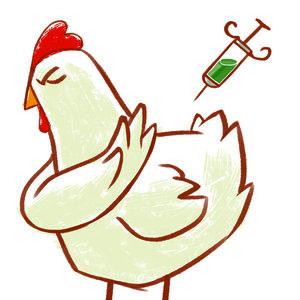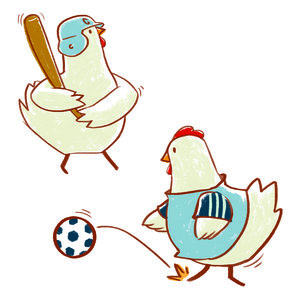USDA Organic is one of the many certifications with standards that include animal welfare practices.
These are some of the ways going Organic can help provide a healthier and more natural living environment for chickens.

NOT ADMINISTERED ANTIBIOTICS:
“Antibiotic-free” (ABF), is a package claim showing up in grocery store meat cases more frequently these days—what gives?
When animals are treated with the same antibiotics that are used in human medicines, bacteria like salmonella and E.coli can build a resistance to these ‘medically-important” antibiotics—making it harder to treat humans who do become infected.
Getting ahead of the possibility for these “superbugs” to build stronger resistance to human medicines is on the minds of many.
Clearly, antibiotic use in animal agriculture is huge, and as the FDA and CDC and WHO all agree, much of it is unnecessary. Data collection is important. But, because resistant bugs quickly adapt, we can’t afford to wait for data to take action to reduce antibiotic use wherever possible.
– William T. Grant
Foundation Distinguished Fellow
Food Systems and Public Health
at the University of Minnesota School of Public Health
Organic farming is on the front lines of this movement by prohibiting the use of antibiotics in livestock. If animals require antibiotics, they’ll be separated from the rest of the group and treated (it’s humane to care for sick animals)—but they will not be sold as Organic. However, farmers and organizations have worked together to better understand how to keep their flocks from getting sick in the first place. It’s not a simple task, and it requires farmers to take great care of their operations (like keeping the houses at a low density, replacing the bedding between each flock, giving access to the outdoors), but these extra steps result in an overall healthier and happier living environment for the birds.

STRONGER IMMUNE RESPONSE:
Feeding flocks an Organic diet might be a contributing factor to why these birds are able to fight off disease without the use of antibiotics.
A comprehensive study published by the British Journal of Nutrition in 2010 gave insight to a measured difference between chickens fed Organic or conventional feed. It was observed that Organically fed chickens have lower body weights, higher immune reactivity, and stronger catch-up growth after infections.
When talking about these two together (Organic and antibiotic-free), it’s important to note that Organic always means antibiotic-free, but antibiotic-free doesn’t always mean Organic. Just like all chickens are birds, but not all birds are chickens.

MORE ACTIVE AND PLAYFUL:
While conventional chicken houses are low-lit with LED lights and sealed shut, the USDA Organic standards call for year-round sunlight through windows along the side of the houses, and regular access to pasture. It’s not hard to understand how outdoors and sunlight might play a role in encouraging active and playful behavior for any animal.
Pleasant Hill Poultry has moved their operation to Organic after conventional farming for 30 years. They’ve noted some big differences in flock behavior after converting their chicken houses to meet Organic standards:

I can see a huge difference between the characteristics of organic vs conventional birds. The organic birds are much more alert and playful. They seem to play more and are generally more active. They also seem to really enjoy spending time outside when the weather is applicable. I believe it’s a combination of a healthy diet and a quality living environment.
– Farmer Jason, Pleasant Hill Poultry

INCREASED OVERALL HEALTH:
These are some of the ways going Organic can help support a healthier quality of life for everyone involved. Living in houses that are clean, with access to fresh air and sunlight, high-quality feed and high-quality care makes a difference in the lives of chickens, and their human caretakers. It’s a win-win-win-win in our book.
🌱
When it comes to the health and welfare of farm animals, it’s worth considering what ways going Organic is worth the investment. Click the links in this post as a starting point for further reading, and search out more reasons why going Organic is better for the birds.



